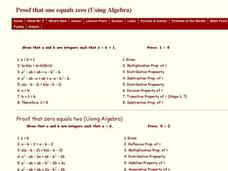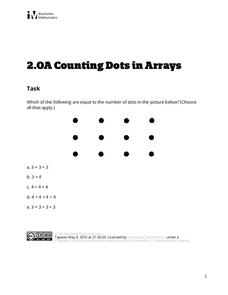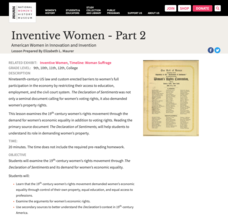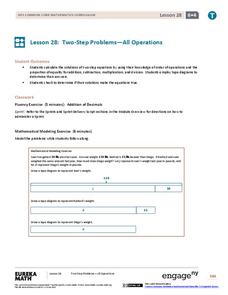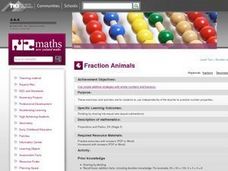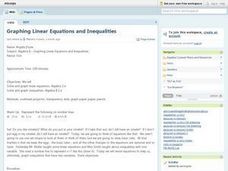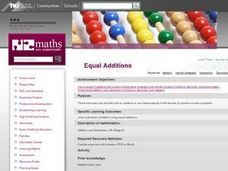Curated OER
Algebra 1 Properties
In this Algebra 1 properties worksheet, students match the name of the property with the expression for 14 properties used to evaluate and simplify algebraic expression.
Curated OER
Solving Linear Equations
How do you solve linear equations? Learn how to solve simple linear equations by applying properties of equality in this instructional slideshow. The materials include step-by-step instructions and key concepts to support understanding.
Curated OER
Proof that One Equals Zero and Zero Equals Two
In this algebra worksheet, 11th graders complete proofs that show why properties are true. There are 2 proofs given with 8 required steps.
Curated OER
Three- and Two- Dimensional Geometry
In this three- and two- dimensional geometry worksheet, 7th graders solve 12 various problems related to geometric shapes and measurement. They first use paper and a pencil to sketch the front, side, back, top and bottom views of each...
Curated OER
Integers - Graphical Representation
In this integers worksheet, 8th graders solve 21 various types of problems to include writing statements given as integers, writing a positive or negative integer for each point on a number line, and arranging integers in order from...
Willow Tree
Solving Inequalities
What does solving an inequality have in common with solving an equation? Almost everything! A math resource focuses on the one exception. The examples lead learners through the steps of solving an equality when multiplying or dividing by...
Illustrative Mathematics
Counting Dots in Arrays
Mathematical arrays can represent several different math skills, including counting groups, multiplication, and even area. In this specific task, learners are asked to identify the addition equations that are equal to a 3 x 4 array....
Houghton Mifflin Harcourt
Unit 8 Math Vocabulary Cards (Grade 6)
Additive inverse, expression, and irrational numbers are a few terms you'll find when you use a set of 22 flashcards designed to reinforce math vocabulary. The set includes two types of cards; a bold-faced word card, and a corresponding...
Teach Engineering
Bone Density Math and Logarithm Introduction
What do logarithms have to do with bone density? Scholars learn that the equation for bone density includes logarithms. The majority of the third lesson of seven is devoted to logarithms and their properties.
Curated OER
Properties of Angles, Lines, and Triangles
In this properties of angles, lines and triangles instructional activity, 10th graders solve and complete 28 different problems that include determining the measurement of various figures shown. First, they use the geometric properties...
Curated OER
Properties of Quadrilaterals
In this properties of quadrilaterals worksheet, students use the properties of quadrilaterals to find the perimeter, angle measurement or length of a missing side of a given polygon. Examples and explanations of the properties are...
Curated OER
Addition and Subtraction Pick n Mix 2
Fourth graders practice a wide range of strategies for solving addition and subtraction problems containing decimal fractions. They add and subtract fractions, decimals and integers while generalizing the properties of operations with...
Curated OER
Addition Exercises
In this adding worksheet, students add two digits and fill in the blank that makes the equations balance. Students solve seven problems.
Curated OER
Identity and Equality Properties
In this math worksheet, students solve five problems, identifying each property as it is used. They identify the used property in 9 problems.
Curated OER
Additive Inverses
Students investigate properties of additive inverses. In this properties of additive inverses lesson, students discuss the what it means for two numbers to be opposites. Students discuss representing opposite numbers using a negative...
National Woman's History Museum
Inventive Women - Part 2
The Declaration of Independence was published in 1776. The Declaration of Sentiments and Resolutions, modeled after the Declaration of Independence, was drafted and read by Elizabeth Cady Stanton at the Seneca Falls Convention in 1848....
EngageNY
Two-Step Problems—All Operations
Step 1: Use the resource. Step 2: Watch your class become experts in solving two-step problems. Scholars learn to solve two-step word problems in context. They use tape diagrams and algebraic techniques to break the problem into two,...
Curated OER
Fraction Animals
Second, third, and fourth graders explore fraction strategies and division by splitting sets of farm animals into equal numbers. Independently, they read word problems, solve them, and check their answers.
Curated OER
Graphing Linear Equations and Inequalities
Students discuss methods to solve equations and inequalities with one variable. As a review, they write Addition and Subtraction properties of equality and Multiplication and Division properties of equality. Students graph points, write...
For the Teachers
$1 Math
Captivate your class by having them find the value of their names, different zoo animals, musical instruments, etc.,with a mental math lesson. Using the coding formula listed, children learn to fluently estimate and calculate simple sums.
Curated OER
Equal Additions
Learners explore the relationships between numbers through the use of "equal addition" and "equal subtraction." Through the use of number sense, they are able to computer addition and subtraction problems mentally. Individually,...
Curated OER
Multiplication & Division
Helpful for building a multiplication unit that focuses on different strategies. With explanations about repeated addition and subtraction as foundations for multiplication, scaling, summaries of progression, and basic multiplication and...
Curated OER
Using Properties Multiple Choice
In this geometry worksheet, students identify the different properties to represent a given statement. They use proof to show how they arrived at their answer. There are 5 questions with an answer key.
Curated OER
Domain: Operations and Algebraic Thinking
Practice basic operations for young mathematicians in fun ways! Using two decks of cards (Ace through 10 plus the joker), learners play "memory" by matching numbers that can be added to make 10 and writing number sentences. In another...




